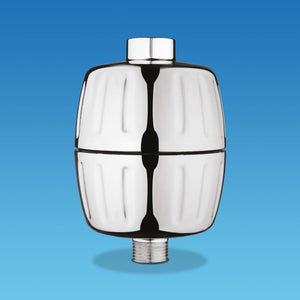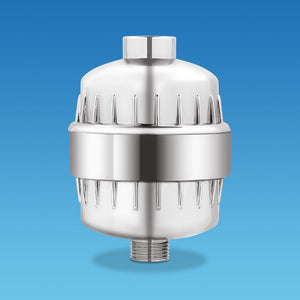Is well water hard or soft? Water is typically hard in a well because the water comes directly from the ground. As it absorbs all the minerals from the soil it’s in, it’s easy to assume it is hard rather than soft.
You can have well water that is soft, but that’s less likely. In this guide, we’ll explore the reasons why well water is usually hard and how to determine whether your well water is hard or soft.
As well as gaining a better understanding of hard versus soft water in wells, you’ll be able to discover the type of well water you have without needing to get professionals in on your behalf.
Well Water Is Usually Hard

Is well water hard water? Well water is usually hard because it absorbs the minerals found in the soil and rock the water passes through. The natural properties found in the soil and rock contribute to the harder work you’ll likely experience when taking water from your well.
Water takes on the properties of the surrounding soil and, depending on the components of said soil and rock, will influence the hardness or softness of the water.
Hard water from a well is typically made up of deposits of chalk, limestone, and gypsum. These are all largely made up of bicarbonates, calcium carbonate, magnesium carbonates, and sulfates.
Water-soluble minerals like these all influence the water’s hardness level. While it might not be so common to find it, you can have hard and soft water within these water dwellings.
What Determines Whether My Well Water Is Hard or Soft?
There are more than two factors that determine whether your well water is hard water or soft water. While it’s less likely to be soft because the water comes directly from the ground, there are occasions when it can be.
1. The Water Source
The water source will directly influence the mineral content and, in general, the overall quality of the water in the well. The depth of the well itself can impact the water’s hardness.
When you’ve got a deeper well, the water passes through more layers of sediment and rock, making it more rich in calcium and magnesium as a result. Not to mention, the sodium content is caused by the erosion of rocks nearby.
There are also different types of water sources that may feed into your well. The main one is groundwater from rainfall or other wet weather conditions. Groundwater from aquifers often contributes, as does surface water that runs off into the well.
The location of the well will also determine the source of the water, with some wells filling up a lot quicker than others. It’s always good to be aware of the water source as this will help you determine how good or bad the water might be.
There’s also a difference between city water and well water, which is worth understanding when making comparisons.
2. The Local Geology

The local geological makeup of the area surrounding your well may affect the composition of the well water. Again, depending on where your well is located is likely influencing the quality and hardness level of the water.
The types of sedimentary rocks and layers that surround the well all contribute to and alter the amount of magnesium minerals in the groundwater. Soil types can also have an impact on the dissolved minerals found in your water.
It might be worth assessing what soil surrounds the well, as well as all the rocks in relation to their formations found in and near the well itself. Look at the local geology in relation to the well, too.
Where Is The Water Table?
Depending on the location of the well, it will determine where the water is coming from. No two wells are the same in their construction or where they are often found.
Near a body of water
When considering the hardness of the water, one should be observant about where the well is in proximity to bodies of water. Whether that’s a nearby river, lake, or even the ocean, the proximity of your well to these bodies of water can influence the water table’s depth as well as its characteristics.
You may find it more common to find soft water near bodies of water because there may have been less exposure to rocks, sediment, and soil.
Atop a hill or mountain

The elevation of your well will directly affect the water table’s position, particularly within areas where there are hills or mountain rocks. With the water table being much deeper in higher elevations, you’ll notice how hefty the mineral content is in your hard or soft water.
Calcium and magnesium might be more present in areas like this, contributing to the hard water and sodium.
Flatlands
As mentioned by the United States Geological Survey, wells are really important to all societies. Another place where these much-needed and reliable water sources can be found is on flatlands.
With water tables in flat areas, they often follow the topography of the land. However, they’re not always flat. When it comes to sourcing hard water, there are factors that impact the stability and depth of the water table in flatlands.
Hard water is more likely to be present, but that can always depend on the climate, the soil permeability, and the land use.
How Do You Know if Your Well Has Hard Water?
Is it hard or soft water? How can you tell if your well has hard water in it? In most cases, you just need to use your eyes in order to spot the difference. There are a few signs that will tell you there’s hard water present.
Soap Scum Residue
Soap scum is often up there with the most common signs of hard water. When you’re trying to identify hard water in your well, you’ll notice that there’s a lot of soap scum on your dishes and glass shower enclosures caused by the build-up of calcium and magnesium ions, not to mention the amount of sodium that comes from rock erosion.
Washing your dishes should ensure clean crockery, but when you have hard water, that can often leave a lot of residue, including around your sinks. It’s better to get a water softener as water softeners work well when washing up.
Mineral Deposits
The formation of mineral deposits is often telling when it comes to suspecting hard water in the well. It’s worth taking a closer look at your pipes and appliances as this can cause excess minerals to build up.
A water softener not only helps to turn hard water into softer water, but it might also help resolve issues within pipes and your plumbing system throughout the whole house.
This scale build-up can cause damage to your appliances and piping, so it’s good to be mindful of how much it impacts your home.
Low Water Pressure
A low water pressure combined with hard water never makes for an enjoyable shower or bath time experience. When it comes to your water supply and the water hardness you experience, hard water usually contributes to a lower water pressure.
The minerals that have built up in your water fixtures will impact the water coming in from your taps. Your well water flow can be tackled with a water filtration system when you’re looking to get rid of hard water. Reverse osmosis has been known to be effective for well water filtration.
Unusual Taste or Texture
You needn’t take a water sample to test for hard water if you’re prone to drinking a lot of water regularly. Many can tell the difference between hard or soft water just by the taste.
The minerals in the hard water will affect the water quality and how it tastes. Your drinking water might have an unusual taste, and you may feel it on your skin and your health in general when you’re drinking hard water.
A water softener can help manage water hardness and make it palatable and kinder to your skin.
Soap Doesn’t Lather
When taking a shower, hard water often is more difficult to lather. When washing your skin or hair, the impact of water hardness can make for a less-than-pleasant experience.
With soap failing to lather properly in hard water due to the minerals, your skin and hair will likely suffer. That’s why it’s a good idea to use heavy duty shower filters with replaceable sediment pads that trap unwanted debris and even some iron sediment.
Should You Use a Shower Head Filter for Well Water?

There are more minerals in hard water than in soft water, so it might be useful to look at shower head filters for well water. To address hard water, you can use water softeners, but it might also be worth incorporating a shower head filter to help your skin, body, hair, and fingernails.
With hard water, more dandruff can appear if your scalp is not treated with more care. The common signs of hard water show up on your dishes, skin, hair, and clothes, so it’s good to tackle it with a water softener or a shower head filter that helps reduce all the heavy minerals that are hardening the water in well systems.
Reduce Hard Well Water with the Help of AquaBliss
Is well water considered hard water? Yes. When it comes to harder water and testing water hardness, it’s easy enough to take a sample for testing. However, simply looking is a visual test that will instantly tell you whether you have hard water or soft water in your well.
The US Environmental Protection Agency is responsible for ensuring public water supplies across the country are safe. However, for your well, which might be private, it’s perhaps worthwhile seeking out a water quality report to test the water’s safety.
In the meantime, to help tackle hard water within your well systems, it’s worth incorporating a heavy duty shower head filter to reduce those minerals that make the water hard.







